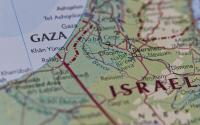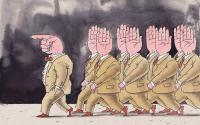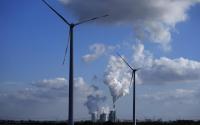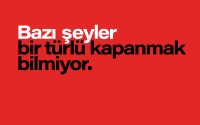Destroying a Town in Order to Save it
12 April 2004Rahul Mahajan |
FALLUJAH, Iraq -- Fallujah is a bit like southern California. On the edge of Iraq's western desert, it is extremely arid but has been rendered into an agricultural area by extensive irrigation. Surrounded by dirt-poor villages, Fallujah is perhaps marginally better off. Much of the population is farmers. The town itself has wide streets and squat, sand-colored buildings. We were in Fallujah during the "ceasefire." This is what we saw and heard. When the assault on Fallujah started, the power plant was bombed. Electricity is provided by generators and usually reserved for places with important functions. There are four hospitals currently running in Fallujah. This includes the one where we were, which was actually just a minor emergency clinic; another one of them is a car repair garage. Things were very frantic at the hopsital where we were, so we couldn't get too much translation. We depended for much of our information on Makki al-Nazzal, a lifelong Fallujah resident who works for the humanitarian NGO Intersos, and had been pressed into service as the manager of the clinic, since all doctors were busy, working around the clock with minimal sleep. A gentle, urbane man who spoke fluent English, Al-Nazzal was beside himself with fury at the Americans' actions (when I asked him if it was all right to use his full name, he said, "It's ok. It's all ok now. Let the bastards do what they want.") With the "ceasefire," large-scale bombing was rare. With a halt in major bombing, the Americans were attacking with heavy artillery but primarily with snipers. Al-Nazzal told us about ambulances being hit by snipers, women and children being shot. Describing the horror that the siege of Fallujah had become, he said, "I have been a fool for 47 years. I used to believe in European and American civilization." I had heard these claims at third-hand before coming into Fallujah, but was skeptical. It's very difficult to find the real story here. But this I saw for myself. An ambulance with two neat, precise bullet-holes in the windshield on the driver's side, pointing down at an angle that indicated they would have hit the driver's chest (the snipers were on rooftops, and are trained to aim for the chest). Another ambulance again with a single, neat bullet-hole in the windshield. There's no way this was due to panicked spraying of fire. These were deliberate shots designed to kill the drivers. The ambulances go around with red, blue, or green lights flashing and sirens blaring; in the pitch-dark of blacked-out city streets there is no way they can be missed or mistaken for something else). An ambulance that some of our compatriots were going around in, trading on their whiteness to get the snipers to let them through to pick up the wounded was also shot at while we were there. During the course of the roughly four hours we were at that small clinic, we saw perhaps a dozen wounded brought in. Among them was a young woman, 18 years old, shot in the head. She was seizing and foaming at the mouth when they brought her in; doctors did not expect her to survive the night. Another likely terminal case was a young boy with massive internal bleeding. I also saw a man with extensive burns on his upper body and shredded thighs, with wounds that could have been from a cluster bomb; there was no way to verify in the madhouse scene of wailing relatives, shouts of "Allahu Akbar" (God is great), and anger at the Americans. Among the more laughable assertions of the Bush administration is that the mujaheddin are a small group of isolated "extremists" repudiated by the majority of Fallujah's population. Nothing could be further from the truth. Of course, the mujaheddin don't include women or very young children (we saw an 11-year-old boy with a Kalashnikov), old men, and are not necessarily even a majority of fighting-age men. But they are of the community and fully supported by it. Many of the wounded were brought in by the muj and they stood around openly conversing with doctors and others. They conferred together about logistical questions; not once did I see the muj threatening people with their ubiquitous Kalashnikovs. One of the muj was wearing an Iraqi police flak jacket; on questioning others who knew him, we learned that he was in fact a member of the Iraqi police. One of our translators, Rana al-Aiouby told me, "these are simple people." Without wanting to go along with the patronizing air of the remark, there is a strong element of truth to it. These are agricultural tribesmen with very strong religious beliefs. They are insular and don't easily trust strangers. We were safe because of the friends we had with us and because we came to help them. They are not so far different from the Pashtun of Afghanistan -- good friends and terrible enemies. The muj are of the people in the same way that the stone-throwing shabab in the first Palestinian intifada were and the term, which means "youth," is used for them as well. I spoke to a young man, Ali, who was among the wounded we transported to Baghdad. He said he was not a muj but, when asked his opinion of them, he smiled and stuck his thumb up. Any young man who is not one of the muj today may the next day wind his aqal around his face and pick up a Kalashnikov. After this, many will. Al-Nazzal told me that the people of Fallujah refused to resist the Americans just because Saddam told them to; indeed, the fighting for Fallujah last year was not particularly fierce. He said, "If Saddam said work, we would want to take off three days. But the Americans had to cast us as Saddam supporters. When he was captured, they said the resistance would die down, but even as it has increased, they still call us that." Nothing could have been easier than gaining the good-will of the people of Fallujah had the Americans not been so brutal in their dealings. Tribal peoples like these have been the most easily duped by imperialists for centuries now. But now a tipping point has been reached. To Americans, "Fallujah" may still mean four mercenaries killed, with their corpses then mutilated and abused; to Iraqis, "Fallujah" means the savage collective punishment for that attack, in which over 600 Iraqis have been killed, with an estimated 200 women and over 100 children (women do not fight among the muj, so all of these are noncombatants, as are many of the men killed). A Special Forces colonel in the Vietnam War said of the town, Ben Tre, "We had to destroy the town in order to save it, encapsulating the entire war in a single statement. The same is true in Iraq today -- Fallujah cannot be "saved" from its mujaheddin unless it is destroyed. Rahul Mahajan is publisher of the weblog "Empire Notes". He was in Fallujah recently and is currently writing and blogging from Baghdad. His most recent book is "Full Spectrum Dominance: U.S. Power in Iraq and Beyond." He can be reached at [email protected] |
http://www.commondreams.org/cgi-bin/print.cgi?file=/views04/0412-01.htm






